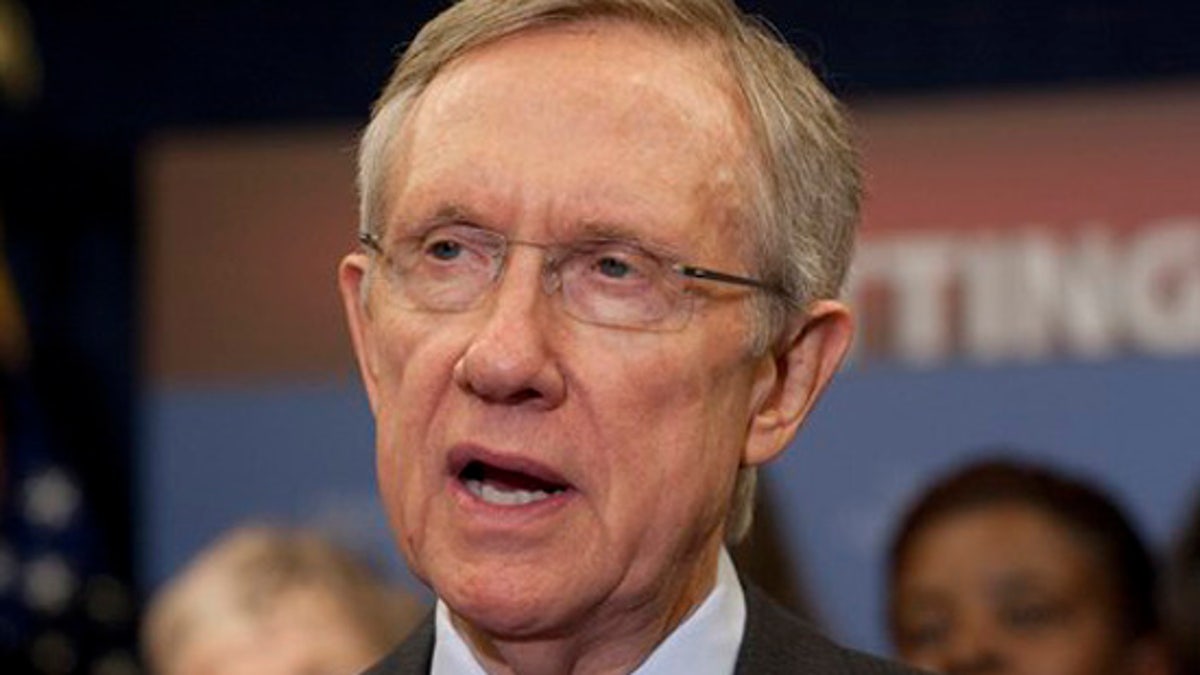
Senate Majority Leader Harry Reid of Nev. speaks during a health care news conference on Capitol Hill in Washington, Thursday, March 11, 2010. (AP)
If a yearlong struggle to pass sweeping health care reform that will affect every American wasn't enough for Democrats, they have now decided to add a sweeping overhaul of student aid to the bill.
That means Democrats will try to muscle through two top administration priorities using a bare-knuckled tactic called reconciliation that only requires the approval of a simple majority in the Senate and prevents Republicans from killing the bills through filibusters.
With the student aid changes folded into the bill, Republicans suddenly had a new reason to oppose legislation they have long sought to scuttle.
"Well of course it's a very bad idea," said Senate Republican leader Mitch McConnell of Kentucky. "We now have the government running banks, insurance companies, car companies, and they do want to take over the student loan business."
He said it was symptomatic of Democrats' determination to have "the government expand its tentacles into absolutely everything."
The decision to add far-reaching student aid changes to the bill had its roots in obscure parliamentary rules governing the Senate's debate of the legislation. But House Democrats and the White House quickly seized on it as a way to advance a top administration priority that lacks the 60 votes needed to clear the Senate otherwise.
The student aid measure, which has been stalled for nearly a year, would require the government to originate student loans, closing out a role for banks and other private lenders who charge a fee. Obama proposed taking the savings and plowing it into higher Pell Grants that go to needy college students.
Officials said that under current estimates, the change would free as much as $66 billion over a decade, although House Speaker Nancy Pelosi indicated she wanted it spread beyond Pell Grants to other education programs.
But the Congressional Budget Office recently said that since some 2,300 colleges and universities have already gone over to direct lending, upping the potential cost of the legislation to $68 billion over a decade, eating up the cost-savings projected.
Not only that but Pell Grants have soared in the bad economy so it is conceivable the fiscal picture could worsen.
But Democrats are confident this will be a popular program, particularly since they are taking the power out of the hands of bankers who are not in danger of winning any popularity contests.
The health care bill appeared on the cusp of passage in early January, but was derailed when Senate Republicans won a Senate seat in Massachusetts, and with it, the strength needed to sustain a filibuster and block a final vote.
In the weeks since, the White House and Democrats have embarked on a two-part rescue strategy. It calls for the House to pass legislation that cleared the Senate in December, despite numerous objections, and for both houses to follow immediately with a second bill that makes changes to the first.
The second, fix-it bill would be drafted under rules that strip Senate Republicans of the ability to require Democrats produce a 60-vote majority.
A procedural vote in the House Budget Committee is set for Monday afternoon, but as of late Friday lawmakers still hadn't gotten the final analysis from the Congressional Budget Office that they need to go forward.
Obama is delaying his departure on an Asian trip for three days -- until March 21 -- and he will go to Ohio next week for a campaign-style pitch for his health care proposals.
The delay gives congressional leaders much-needed breathing room to finish the legislation and nail down support from wavering lawmakers.
At its core, the health care bill is designed to provide health care to tens of millions who lack it and ban insurance companies from denying medical coverage on the basis of pre-existing medical conditions. Obama also wants the measure to begin to slow the rate of growth in medical costs nationwide. Most people would have to get insurance by law, and poor and middle-income Americans -- including families of four earning up to $88,000 -- would receive subsidies.
Whatever the outcome, there was no doubt the issue would reverberate into this fall's elections, with control of Congress at stake.
Obama outlined numerous requested changes several weeks ago, many of them designed to satisfy the concerns of House Democrats.
They would increase subsidies for lower income families who cannot afford insurance, give additional money to states that provide higher-than-average benefits under Medicaid, and gradually close a coverage gap in the Medicare prescription drug program used by millions of seniors.
Congressional officials said all three issues would be addressed in the fix-it bill, although other administration requests remained in doubt. The president wants creation of a commission with authority to force savings in Medicare, for example, and is seeking the deletion of items sought by individual senators.
Those were among the issues still in dispute after days of secretive talks involving the White House and House and Senate leaders.
Fox News' Trish Turner and The Associated Press contributed to this report.




